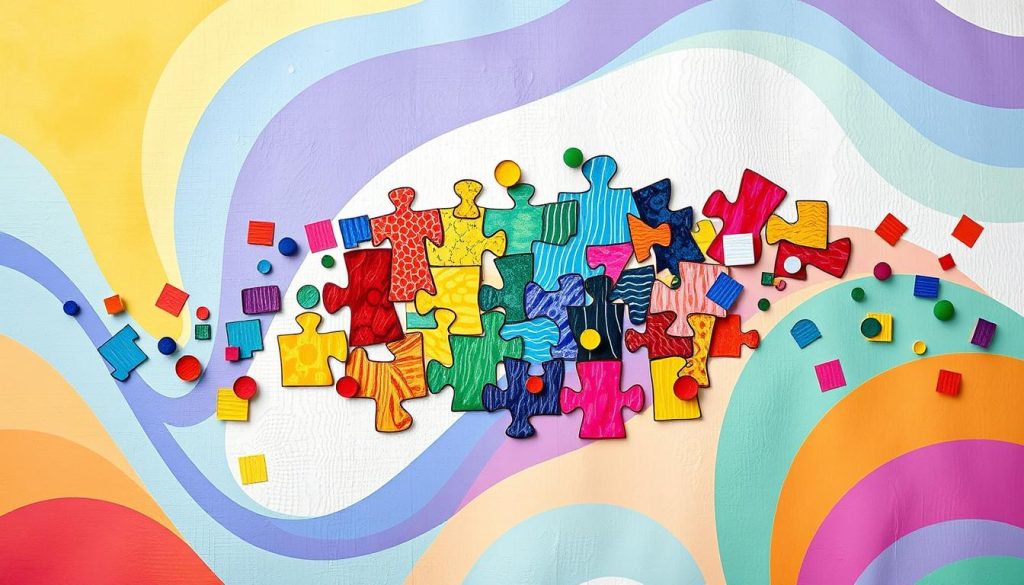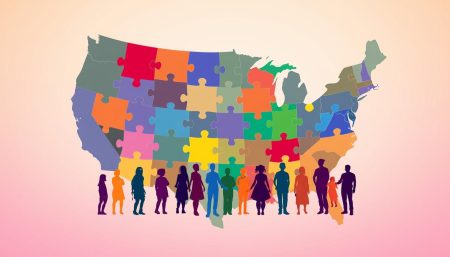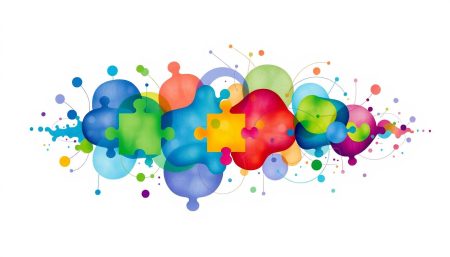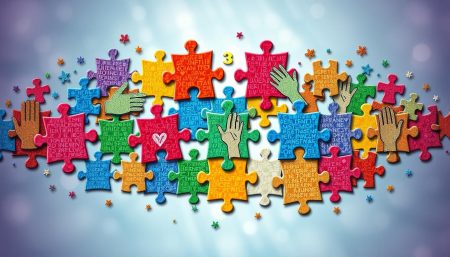Autism spectrum disorder is a complex neurodevelopmental condition that affects millions of people worldwide. The question of whether autism is considered a disability sparks debates in medical, legal, and social circles. This topic holds great importance for individuals seeking support and understanding.
In the United States, disability rights play a key role in shaping the lives of those with autism. These rights can impact access to education, employment, and healthcare. As we explore this subject, we’ll look at different views on autism and its classification as a disability.
Our goal is to provide clear, factual information about autism spectrum disorder and the protections available to those affected by it. We’ll examine legal definitions, medical viewpoints, and social considerations. This will give you a well-rounded understanding of this important topic.
Defining Autism Spectrum Disorder in Modern Context
Our understanding of autism spectrum disorder has grown a lot. It’s a neurodevelopmental condition that affects how people interact, communicate, and behave. Let’s look at how our view of autism has changed and what it means today.
The Evolution of Autism Understanding
In the past, autism was seen as a single condition. Now, we know it’s a spectrum with varied symptoms and severity. This change has helped us better support individuals with autism.
Current Medical Classifications
Today, autism spectrum disorder includes conditions once thought separate. These include Asperger’s syndrome and pervasive developmental disorder. This broader view helps doctors diagnose and treat autism more effectively.
Spectrum-Based Perspective
The spectrum model recognizes that autism affects each person differently. Some may need more support, while others live independently. This view helps create personalized care plans and challenges the idea of autism as a one-size-fits-all disability.
| Past View | Current View |
|---|---|
| Single condition | Spectrum of conditions |
| Limited treatment options | Personalized care plans |
| Focus on limitations | Recognizes strengths and challenges |
This modern understanding of autism spectrum disorder as a complex neurodevelopmental condition helps us provide better support. It also recognizes the unique strengths of individuals with autism.
Is Autism a Disability: Legal and Medical Perspectives
There’s a lot of debate about whether autism is a disability. From a legal view, autism is often seen as a disability that deserves rights. The Americans with Disabilities Act (ADA) says autism is a disability. This means people with autism get help and support.
Doctors see autism as a complex brain condition. They say it affects how people live their daily lives. But they also highlight the strengths of autistic people. This view fits with the idea of accepting and valuing neurological differences.

- Education: Schools must help autistic students with what they need.
- Employment: Workplaces have to make adjustments for autistic people.
- Healthcare: There’s access to special autism treatments.
- Housing: People with autism can’t be unfairly treated when looking for a place to live.
The way doctors treat autism is changing. Now, they focus more on what each person needs. This change helps both the rights of people with disabilities and the acceptance of autism.
| Legal Perspective | Medical Perspective |
|---|---|
| Recognized as a disability under ADA | Neurodevelopmental condition |
| Entitles individuals to accommodations | Focuses on individual strengths and challenges |
| Protects against discrimination | Emphasizes personalized support strategies |
| Ensures access to support services | Promotes understanding of neurodiversity |
The Neurodevelopmental Nature of Autism
Autism spectrum disorder is a complex condition that affects brain development and function. It’s important to understand this to better support those on the spectrum.
Brain Development and Autism
Research shows autism impacts brain structure and connectivity. Kids with autism often have bigger brain volumes and different neural connections. These differences can affect social skills, communication, and behavior.
Genetic Factors
Genetics play a big role in autism. Scientists have found hundreds of genes linked to autism. Some gene variations increase autism risk, while others directly cause it.
Environmental Influences
Environmental factors can also affect autism risk. Exposure to certain chemicals, older parental age, and pregnancy complications may increase risk. But, these factors alone don’t cause autism.
| Factor | Impact on Autism Risk |
|---|---|
| Genetics | High |
| Brain Development | Significant |
| Environmental Influences | Moderate |
Understanding autism’s neurodevelopmental nature helps us create better support strategies. This promotes the well-being of those on the spectrum.
Understanding Autism Rights and Protections
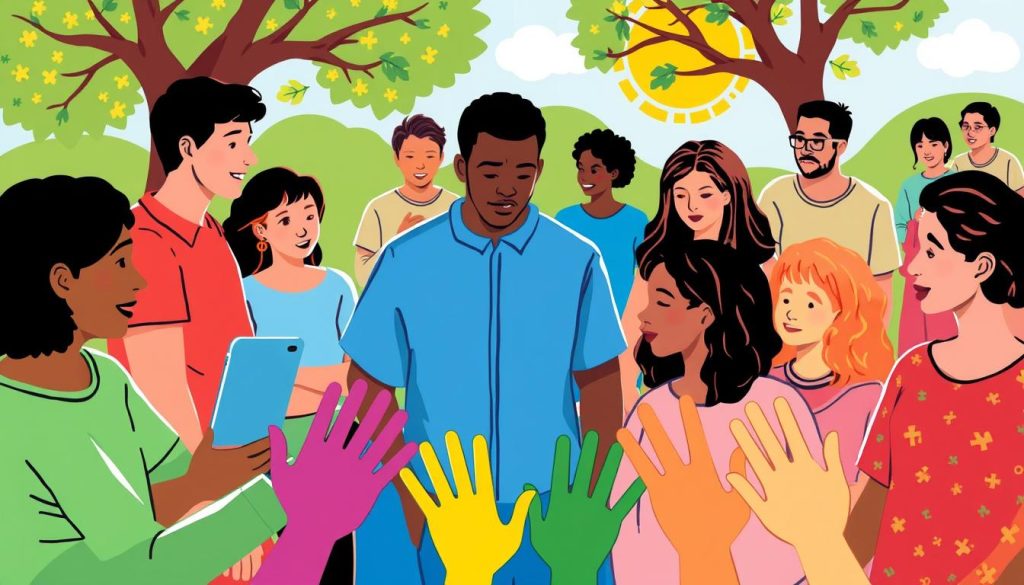
In the United States, people with autism have specific rights and protections. These laws aim to promote disability rights and foster autism acceptance. They ensure equal chances in various aspects of life.
The Americans with Disabilities Act (ADA) is a key law for disability rights. It stops discrimination against people with autism in work, school, and public places. This law lets autistic individuals have the same opportunities as others.
Education is another area where autism rights are protected. The Individuals with Disabilities Education Act (IDEA) makes sure students with autism get free and proper education. Schools must make education plans that fit each student’s needs.
In the workplace, autism acceptance is increasing. Employers must make reasonable changes to help autistic employees. These changes might include adjusting work schedules or using assistive technology.
As we move towards more autism acceptance, it’s important to know and respect these rights. This way, we make a world where autistic individuals can grow and share their talents.
Disability Benefits and Support Services for Autistic Individuals
Autistic individuals in the United States have access to many disability benefits and support services. These programs aim to improve their quality of life and support their rights. They help those on the autism spectrum.
Social Security Benefits
The Social Security Administration offers financial help to eligible autistic individuals. These benefits can cover living expenses and medical costs. To qualify, applicants must meet certain criteria related to their autism diagnosis and functional limitations.
Healthcare Coverage Options
Many autistic individuals qualify for Medicaid or Medicare. These programs offer essential healthcare coverage, including therapy services and medical equipment. Some states also offer special needs support through waiver programs, making autism-specific treatments more accessible.
State-Specific Programs
Each state has its own programs to support autistic residents. These may include vocational training, respite care, and educational assistance. State disability offices can provide information on local resources and eligibility requirements.
- Vocational rehabilitation services
- Home and community-based services
- Assistive technology programs
Understanding and accessing these benefits can be tough. Many organizations offer guidance to help autistic individuals and their families. They help navigate the complex system of disability rights and special needs support.
Educational Accommodations for Autistic Students
Autistic students have unique learning needs. Schools in the United States are working hard to support them. They want to make sure these students have the same chances to learn as everyone else.
Individualized Education Programs (IEPs) are key for support. These plans are made just for each student. They set goals, services, and accommodations for autistic students. IEPs might include:
- Modified curriculum
- Extra time for assignments and tests
- Use of assistive technology
- One-on-one support from specialized educators
504 plans are also important. They help students who don’t need an IEP but need some support. These plans can have things like better seating, breaks, or visual schedules.
Schools also offer extra help for autistic students. This help can include:
- Speech and language therapy
- Occupational therapy
- Social skills training
- Behavioral interventions
By using these accommodations and services, schools try to make a welcoming place for autistic students. It’s important for parents and teachers to work together. This way, autistic learners can do well in school and with friends.
Workplace Rights and Accommodations
In the United States, autistic individuals have specific rights in the workplace. These rights come from disability rights laws and promote acceptance of autism. Let’s look at how these laws protect autistic employees and the accommodations they can get.
ADA Protections
The Americans with Disabilities Act (ADA) protects autistic individuals from workplace discrimination. This law makes sure they have equal chances in hiring, promotions, and job tasks. Employers must offer reasonable accommodations to help autistic employees do their jobs well.
Reasonable Workplace Adjustments
Workplace adjustments can really help autistic employees. These might include:
- Noise-canceling headphones for sensitive hearing
- Flexible work schedules
- Clear, written instructions for tasks
- A quiet workspace to reduce sensory overload
Such accommodations make the work environment more inclusive. They support autism acceptance in the workplace.
Employment Support Programs
There are many programs to help autistic individuals find and keep jobs. These programs focus on job skills, interview prep, and on-the-job support. Some well-known programs are:
| Program Name | Services Offered | Eligibility |
|---|---|---|
| Autism at Work | Job matching, training, mentorship | Autistic adults |
| Project SEARCH | Internships, skill development | Young adults with disabilities |
| Vocational Rehabilitation | Career counseling, job placement | Individuals with disabilities |
By knowing their rights and using these resources, autistic individuals can do well at work. Employers who value neurodiversity find that autistic employees add unique skills and views. This makes the work environment better for everyone.
Sensory Processing Challenges in Autism
People with autism spectrum disorder often face unique sensory challenges. These issues can greatly affect their daily lives. They can change how they interact with their surroundings and others.

Sensory processing problems in autism can show up in different ways. Some might find everyday sounds, lights, or textures too much. Others might seek out intense sensory experiences to feel alive.
Common sensory challenges for those with autism include:
- Sensitivity to loud noises or specific sound frequencies
- Difficulty with bright lights or certain visual patterns
- Discomfort with certain textures in clothing or food
- Unusual reactions to smells or tastes
- Challenges with balance or body awareness
To tackle these sensory challenges, many strategies and accommodations can help. Creating a sensory-friendly space, using noise-canceling headphones, or taking sensory breaks can make a big difference.
| Sensory Challenge | Accommodation Strategy |
|---|---|
| Noise sensitivity | Noise-canceling headphones, quiet spaces |
| Light sensitivity | Dimmer switches, tinted glasses |
| Tactile sensitivity | Seamless clothing, sensory-friendly fabrics |
| Olfactory sensitivity | Fragrance-free environments, air purifiers |
It’s key to understand and tackle sensory processing challenges for those with autism. By using the right strategies, we can make environments more inclusive and comfortable for everyone.
Social Communication and Autism
Autism spectrum disorder changes how people communicate. Those with autism often struggle with talking and body language. Knowing this helps us make places more welcoming.
Verbal Communication Patterns
People with autism talk differently. Some sound very serious or use fancy words. Others find it hard to keep a conversation going.
Children with autism often start talking later than others.
Non-verbal Communication
Reading body language is hard for those with autism. They might not get facial cues or eye contact right. This can cause confusion in social situations.
Social Interaction Strategies
Here are ways to help with social interactions:
- Use clear, direct language
- Provide visual supports
- Practice social skills in structured settings
- Encourage interests as conversation starters
- Create predictable routines for social events
By understanding autism’s communication challenges, we can make spaces more welcoming. With the right support, people with autism can do well in social situations.
Early Intervention Services and Their Impact
Early intervention services are key for kids with autism. They help improve developmental skills in the early years. Starting support early helps kids reach their highest abilities.

These services include speech, occupational therapy, and behavioral help. They tackle many autism challenges. For instance, speech therapy boosts communication, and occupational therapy helps with daily tasks.
The effects of early help are big. Kids see better language, social, and thinking skills. Families often see their kids get ready for school better and need less help later.
| Early Intervention Service | Focus Area | Potential Benefits |
|---|---|---|
| Speech Therapy | Communication | Improved language skills, better social interaction |
| Occupational Therapy | Daily Living Skills | Enhanced independence, improved motor skills |
| Behavioral Intervention | Behavior Management | Reduced challenging behaviors, increased positive interactions |
Getting early help varies by where you live. Many states offer programs through education or health departments. You can also find help at private therapy centers or autism groups. The most important thing is to start early and keep up with the help.
The Role of Support Systems and Communities
Support systems are key for people with autism. They offer special needs support and help with acceptance. This creates a safe space for growth and learning.
Family Support Networks
Families are the first support for autistic individuals. Parents, siblings, and relatives work together. They make a safe and understanding home.
They learn about autism and adapt routines. They also advocate for their loved ones’ needs.
Professional Support Teams
Professional teams offer specialized care and guidance. They include therapists, special education teachers, psychologists, and medical professionals.
Together, they create plans that meet each person’s unique needs.
Community Resources
Communities provide resources for autism acceptance and support. There are local support groups, autism-friendly events, and inclusive programs. These help with social skills and development.
Online communities also offer a place to share experiences and advice. They connect autistic individuals and their families.
Understanding Executive Functioning in Autism
Executive functioning is key for daily life in autism spectrum disorder. It affects planning, organizing, and time management. People with autism may find these tasks hard, making everyday activities tough.
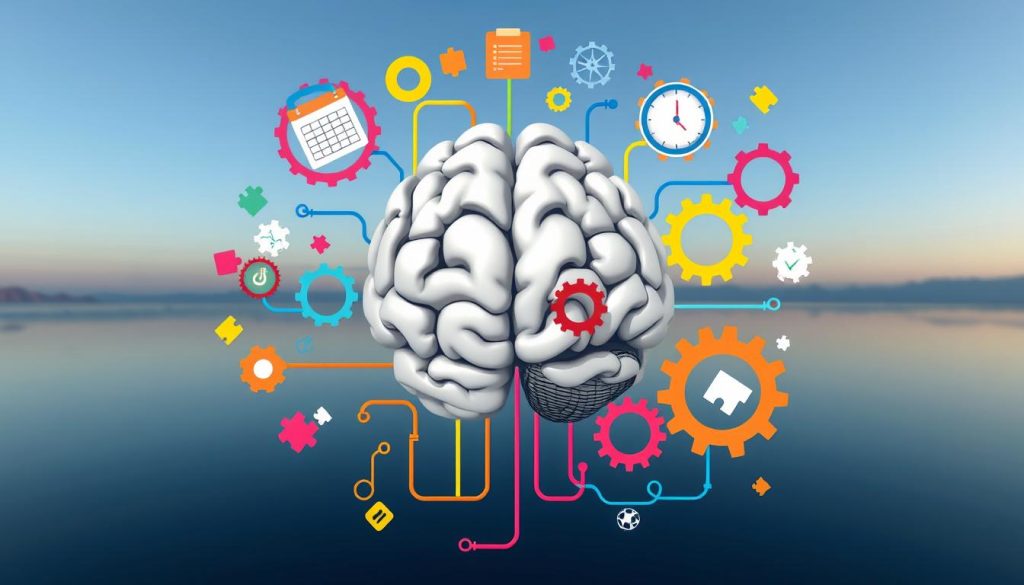
Those with autism often struggle with working memory. This skill is vital for keeping information while doing tasks. They might have trouble switching between tasks or controlling impulses. These issues can complicate school, work, and social life.
Here are some ways to help with executive functioning in autism:
- Breaking tasks into smaller steps
- Using visual schedules and reminders
- Creating structured routines
- Practicing time management skills
Understanding these challenges helps families and educators support those with autism. Tailored help can boost executive functioning skills. This leads to more independence and success in life.
| Executive Function | Common Challenges | Support Strategies |
|---|---|---|
| Working Memory | Forgetting instructions | Use written lists and reminders |
| Task Initiation | Difficulty starting activities | Break tasks into smaller steps |
| Time Management | Losing track of time | Use timers and visual schedules |
| Emotional Control | Intense reactions to changes | Teach coping strategies |
Life Skills Development and Independence
Learning life skills and becoming independent is key for those with autism. Special needs support is vital in helping them face daily challenges and gain more freedom. This includes learning daily living skills, mastering self-advocacy, and getting support for independent living.
Daily Living Skills
Teaching daily living skills to those with autism needs patience and a structured approach. These skills include taking care of personal hygiene, cooking meals, and managing the home. It’s important to remember that everyone learns at their own pace and may need special strategies to learn these skills.
Self-Advocacy Training
Self-advocacy is a vital skill for autistic individuals. It means learning to express needs, make choices, and stand up for oneself. Training programs help build confidence, understand personal strengths, and navigate social situations well.
Independent Living Support
Support for independent living comes in many forms, like assisted living facilities or in-home care. These services aim to give autistic adults the right mix of help and freedom. Community programs often provide job training, social skills development, and ongoing support to help them become independent.
By focusing on these areas, individuals with autism can gain the skills for more independence. This journey towards self-reliance is a big part of accepting and empowering autistic people in society.
The Intersection of Autism and Mental Health
Autism spectrum disorder is a complex neurodevelopmental condition. It often intersects with various mental health challenges. Many individuals on the spectrum face co-occurring conditions that affect their well-being. It’s important to understand this connection for better support and care.
Common mental health issues among autistic individuals include:
- Anxiety disorders
- Depression
- Obsessive-compulsive disorder (OCD)
- Attention deficit hyperactivity disorder (ADHD)
These conditions can make living with autism spectrum disorder harder. It’s vital to address both aspects of an individual’s health. Early identification and intervention are key to improving outcomes and quality of life.
Strategies for supporting mental health in autistic individuals include:
- Tailored therapy approaches
- Stress management techniques
- Social skills training
- Medication management when appropriate
By recognizing the unique needs of individuals with autism spectrum disorder, we can create more inclusive environments. This holistic approach addresses both the neurodevelopmental aspects of autism and mental health concerns. It fosters overall well-being and personal growth.
Embracing Neurodiversity and Autism Acceptance
The world is changing how it sees autism. We’re moving from seeing it as a problem to embracing it. We’re learning to value the unique ways autistic brains work. This idea is called neurodiversity.
It means we all think differently, and that’s okay. This shift helps autistic individuals feel more understood and valued. It opens doors for them in school, work, and social settings.
Embracing neurodiversity benefits everyone. It leads to more creative solutions and diverse perspectives. Companies like Microsoft and SAP are actively hiring autistic employees. They recognize the unique skills and talents that come with this neurodevelopmental condition.
As we move forward, let’s keep pushing for autism acceptance. By understanding and valuing different neurological experiences, we create a richer, more inclusive society. Everyone has something special to offer, and that’s what makes our world amazing.
FAQ
Q: Is autism considered a disability under U.S. law?
A: Yes, autism is seen as a disability in the U.S. This includes the Americans with Disabilities Act (ADA). It means people with autism get legal protections and help in many areas, like school, work, and public services.
Q: What rights do individuals with autism have in the workplace?
A: People with autism have the right to work adjustments under the ADA. This could be changes in work hours, the work area, or how they communicate. Employers must make these changes unless it’s too hard for the company.
Q: How does autism affect brain development?
A: Autism changes brain development in different ways. It can affect areas for social skills, handling senses, and planning. These changes lead to the unique traits and challenges of autism.
Q: What are some common sensory processing difficulties in autism?
A: Many with autism face sensory challenges. They might be too sensitive or not sensitive enough to sounds, lights, textures, or smells. Some get overwhelmed, while others seek out strong sensory experiences.
Q: Are there specific educational accommodations for students with autism?
A: Yes, students with autism get special help in school. This includes Individualized Education Programs (IEPs), 504 plans, and more. The help depends on what each student needs.
Q: What is early intervention, and why is it important for autism?
A: Early intervention helps young children with autism before they start school. It’s key because it can greatly improve their development and skills. It helps them adapt better to their surroundings and can lead to better outcomes later in life.
Q: How does autism affect social communication?
A: Autism can make social communication hard in many ways. People might struggle with non-verbal cues, social rules, or keeping conversations going. But, how it affects each person can vary a lot.
Q: What is neurodiversity, and how does it relate to autism?
A: Neurodiversity sees brain differences, like autism, as natural variations, not disorders. It promotes acceptance and highlights the strengths and contributions of those with autism, focusing on what they can do, not just what they can’t.
Q: Can individuals with autism live independently?
A: Many with autism can live on their own, but some need more support. It depends on their abilities, challenges, and support systems. With the right skills and help, many can live independently as adults.
Q: How does autism impact executive functioning?
A: Autism can affect planning, organizing, and other executive functions. Some might find it hard to start tasks, switch between activities, or handle complex tasks. But, with the right strategies and support, these challenges can be managed.












